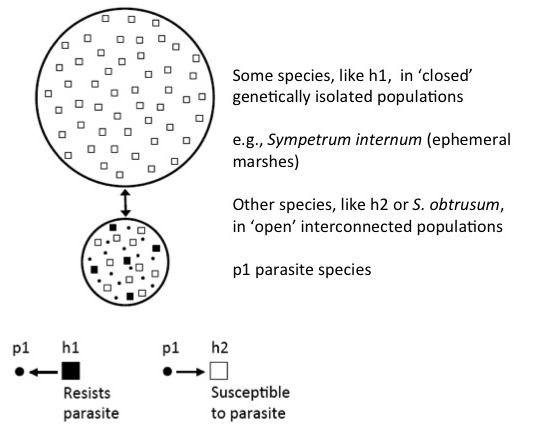Courses
Ecological parasitology
BIOL 4902A (CRN: 10469)
Winter 2017
Lecture: Wednesdays 1435-1735
Ecology can be loosely defined as the study of the biotic and abiotic factors influencing the distribution and abundance of organisms. Parasitology is the study of parasites: organisms that, according to Price (1980), live in or on other living organisms, derive some or all of their nutriment from those organisms known as hosts, and cause some degree of harm. Parasites are now thought to account for well over half of all living species so it behooves researchers to study parasite ecology and parasites have provided some of the better examples of ecological principles such as competition. It is also important to study parasites in terms of their influence on the distribution and abundance of their hosts. This is especially important when we consider microparasites, also thought of as pathogens, which are known to cause massive die offs in naïve host populations. Ecological parasitology is often imbued with an evolutionary framework as changes in the genetic makeup of either host or parasites [and its influence on phenotypic resistance or virulence] can have far-reaching effects.
This course will combine independent research projects and seminars to address many of the recent advances and persistent knowledge gaps in ecological parasitology.
Prerequisites: BIOL 2600 and one of BIOL 3609, BIOL 36011, BIOL 3612, BIOL 3801, BIOL 3802, BIOL 3804
Winter 2017
Lecture: Wednesdays 1435-1735
Ecology can be loosely defined as the study of the biotic and abiotic factors influencing the distribution and abundance of organisms. Parasitology is the study of parasites: organisms that, according to Price (1980), live in or on other living organisms, derive some or all of their nutriment from those organisms known as hosts, and cause some degree of harm. Parasites are now thought to account for well over half of all living species so it behooves researchers to study parasite ecology and parasites have provided some of the better examples of ecological principles such as competition. It is also important to study parasites in terms of their influence on the distribution and abundance of their hosts. This is especially important when we consider microparasites, also thought of as pathogens, which are known to cause massive die offs in naïve host populations. Ecological parasitology is often imbued with an evolutionary framework as changes in the genetic makeup of either host or parasites [and its influence on phenotypic resistance or virulence] can have far-reaching effects.
This course will combine independent research projects and seminars to address many of the recent advances and persistent knowledge gaps in ecological parasitology.
Prerequisites: BIOL 2600 and one of BIOL 3609, BIOL 36011, BIOL 3612, BIOL 3801, BIOL 3802, BIOL 3804

